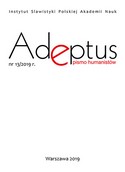Paradoxes in Jīva Gosvāmī’s concept of the soul, path to perfection and liberation
Paradoxes in Jīva Gosvāmī’s concept of the soul, path to perfection and liberation
Author(s): Dagmara WasilewskaContributor(s): Jan Szelągiewicz (Translator)
Subject(s): Metaphysics, Early Modern Philosophy, Indian Philosophy, 16th Century, Ontology
Published by: Instytut Slawistyki Polskiej Akademii Nauk
Keywords: Indian philosophy; paradox; Bengali Vaishnavism (gauḍīya); Jīva Gosvāmī (1517–1608);
Summary/Abstract: This article is devoted to the role and significance of paradoxes in the philosophical thought and mysticism of the sixteenth-century Bengali Vaishnava theologian Jīva Gosvāmī. He situates his system within the Vedānta school, where the main category distinguishing its branches and deciding on their specific character is the relation between the Absolute, the phenomenal world and the human being. In Gosvāmī’s school, this relation involves identity and distinctness (bhedābheda) of those categories at the same time, referred to by the word acintya (“inaccessible to reason”), which further stresses this ontological paradox. Although doctrinally the most important, it is not the only paradox in Gosvāmī’s thought. Adopting this core metaphysical thesis engendered many other aporias, including those concerning the nature of the soul, the concept of bhakti (loving devotion to a deity) and the idea of liberation (mukti), which Goswāmī then attempts to solve in his most important philosophical treatise – Ṣaṭsandarbha.
Journal: Adeptus
- Issue Year: 2019
- Issue No: 13
- Page Range: 1-23
- Page Count: 23
- Language: English

